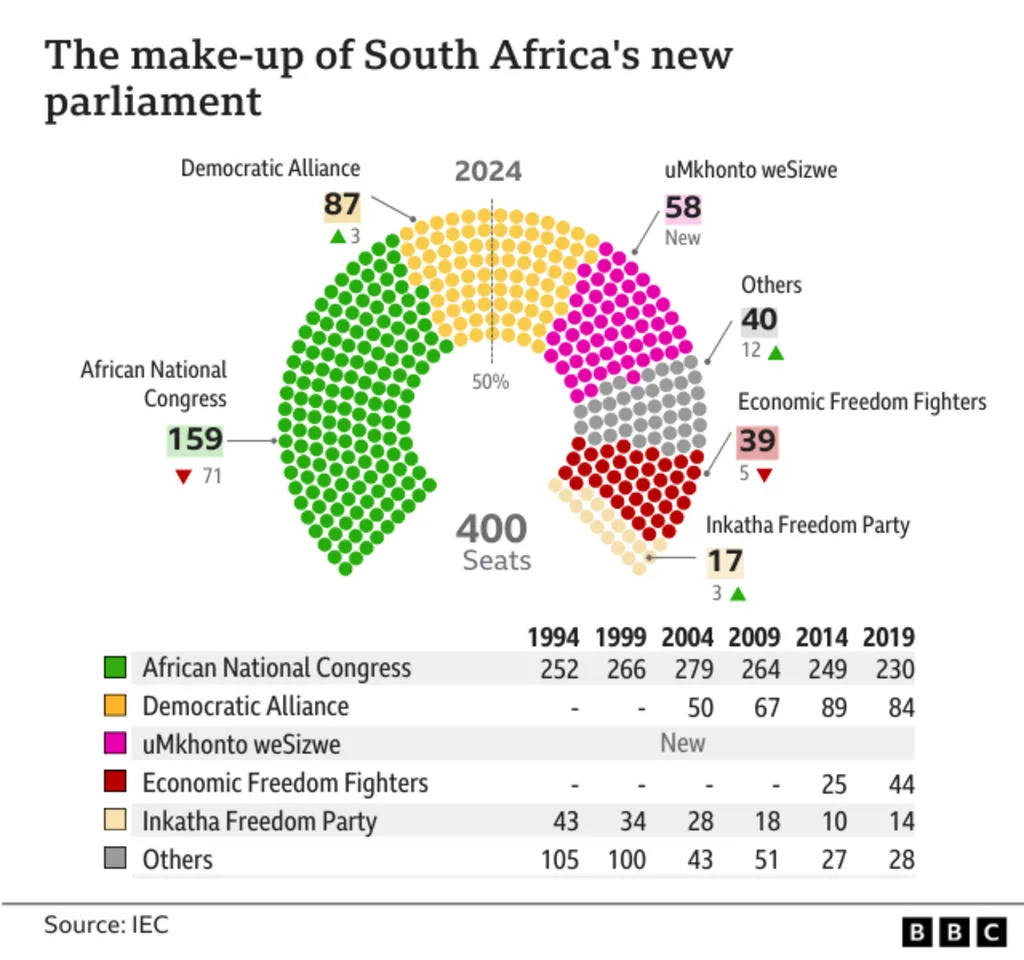South Africa: ANC-DA-IFP-PA Coalition Will Run the Government

Bottom Line: As we predicted, African National Congress (ANC) and Democratic Alliance (DA) formed a government of national unity (GNU) with the ANC-lead on June 14, along with two smaller opposition parties, Inkatha Freedom Party (IFP) and Patriotic Alliance (PA). Lawmakers voted to put former president Ramaphosa back in office for his second term. Ramaphosa will be sworn in and will unveil his new cabinet this week. ANC-DA coalition is a relief for the business community and investors, though foreign policy, land reform, ANC’s black empowerment program, and the National Health Insurance could become clashing points to threaten stability. According to draft of the coalition deal, rapid, inclusive and sustainable economic growth was listed as a top priority. This will be difficult to achieve given limited fiscal space and the need to fix the power and logistic crisis first.
ANC and the main opposition DA have agreed to form a GNU along with two smaller opposition parties, IFP and PA on June 14. ANC leader Cyril Ramaphosa will remain the president for five more years as he was re-elected by fellow MPs with 283 votes in a secret ballot, challenged by Julius Malema, the leader of the radical leftist Economic Freedom Fighters (EFF), whose candidacy gained 44 votes. After the elections on Friday, the president and speaker are now both from the ANC, the deputy speaker, some ministries and the respective parliament committees will be led by the DA, and the IFP is expected to be given the post of chair of chairs. Ramaphosa will be sworn and will unveil his new cabinet this week.

The current coalition is largely centrist and involves parties with different views. The largest coalition party, the DA, is a centre-right party pushes a liberal, free-market agenda. The IFP, is a conservative, pro-Israel, pro-West party that is hostile to migrants. ANC is a central leftist party and PA is a far-right party.
Despite the coalition deal, there remains major differences between ANC and the DA in terms of foreign policy, land reform, ANC’s black economic empowerment policies, the National Health Insurance (NHI). It appears ANC’s government-funded national health service, NHI, can be a clashing point strongly rejected by the DA, as DA says it is expensive and threatens the future of the private health sector. ANC’s black empowerment program, which aims to give black people a stake in the economy as a response to their exclusion during the apartheid era, is not supported by the DA. In addition to this, ANC’s opposition to Israel over the case of the Gaza conflict can be challenged by the DA’s alignment with Western perspectives and its backing of Israel. These can negatively affect coalition stability in the future.
While this deal is a significant step, DA leader Steenhuisen stated that South Africa's problems, such as crime and economic issues, would not be solved overnight and that the road ahead will be difficult. Steenhuisen added that the coalition agreement included a consensus mechanism to deal with the disagreements that will inevitably arise.
The draft coalition deal puts rapid, inclusive and sustainable growth as a top priority item while other priorities include land reform, job creation, infrastructure development, structural reforms, transformational change, and fiscal sustainability. (Note: SA GDP grew by 0.6% in 2023 and was down 0.1% in Q1 2024). Livelihood support, a social safety net, protecting workers and tackling poverty are other principles behind the GNU. As per the deal document, decisions in the GNU will be made by consensus and there will also be a dispute resolution or a deadlock-breaking mechanism. The power sharing will be broadly proportional as noted in the agreement, ensuring fair representation of both parties in the cabinet.
Taking into account that EFF and MKP are not parts of the coalition, we think the coalition deal will be welcomed by the business sector as it will guarantee economic stability and avoid capital flight. The coalition would likely follow a more liberal framework, with a strong focus on private sector based on labour market to create jobs, inspire entrepreneurship, get tough on crime. We foresee the coalition government backed by DA would likely push for some fiscal tightening in the budget for the current 2024/5 year in July.
We still think the immediate focus of the new government should be the domestic economy, as the unemployment, corruption, poverty, load shedding, financial bottleneck and inequality remain major hurdles, but handling these will take more time as the political decision making processes will be harder than in a one-party government setting. We also envisage the coalition will be weaker at least for some time, and less able to undertake necessary fiscal reform policies abruptly and deal with power cuts (load shedding) in the near future, since the focus will be on shaping the new cabinet and finalizing power sharing.